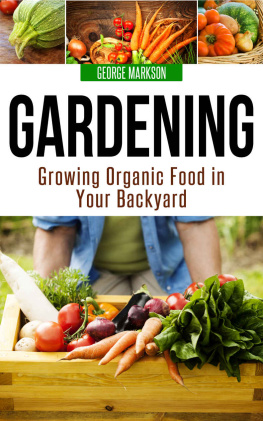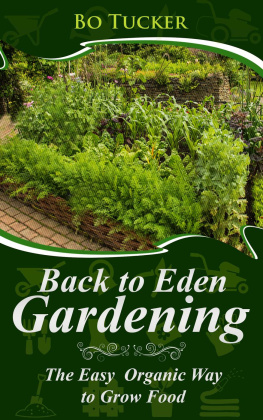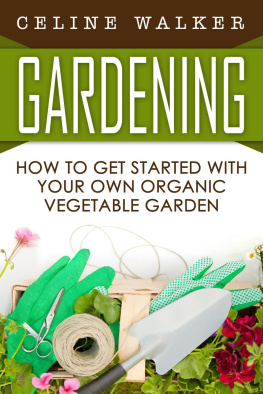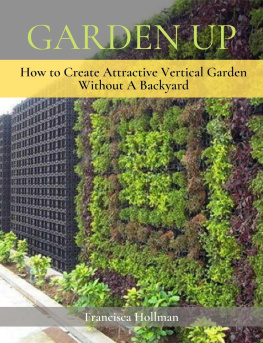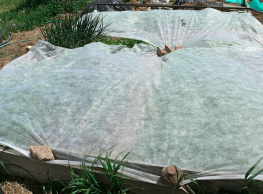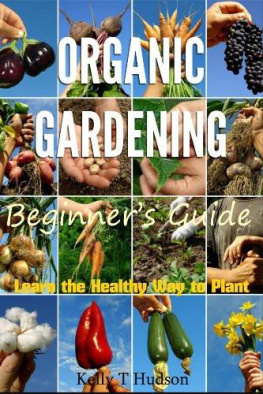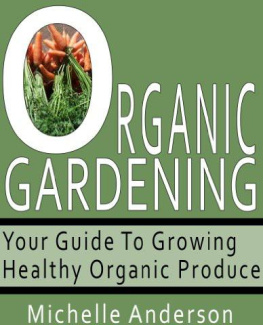Gardening
Growing Organic Food in
Your Backyard
By
George Markson
Copyright 2016 - All rights reserved.
In no way is it legal to reproduce, duplicate, or transmit any part of this document in either electronic means or in printed format. Recording of this publication is strictly prohibited and any storage of this document is not allowed unless with written permission from the publisher. All rights reserved.
The information provided herein is stated to be truthful and consistent, in that any liability, in terms of inattention or otherwise, by any usage or abuse of any policies, processes, or directions contained within is the solitary and utter responsibility of the recipient reader. Under no circumstances will any legal responsibility or blame be held against the publisher for any reparation, damages, or monetary loss due to the information herein, either directly or indirectly.
Respective authors own all copyrights not held by the publisher.
Legal Notice:
This book is copyright protected. This is only for personal use. You cannot amend, distribute, sell, use, quote or paraphrase any part or the content within this book without the consent of the author or copyright owner. Legal action will be pursued if this is breached.
Disclaimer Notice:
Please note the information contained within this document is for educational and entertainment purposes only. Every attempt has been made to provide accurate, up to date and reliable complete information. No warranties of any kind are expressed or implied. Readers acknowledge that the author is not engaging in the rendering of legal, financial, medical or professional advice.
By reading this document, the reader agrees that under no circumstances are we responsible for any losses, direct or indirect, which are incurred as a result of the use of information contained within this document, including, but not limited to, errors, omissions, or inaccuracies.
Introduction
Chapter 1: Why Grow Your Own Organic Food?
Chapter 2: Gardening For The Body, Mind And Spirit
Chapter 3: Key Components for Your Soil
Nitrogen
Phosphorus
Potassium
Chapter 4: Making Basic Organic Compost and Pesticides at Home
Chapter 5: Weed Control In Your Organic Garden
Chapter 6: Smart Watering In Your Vegetable Garden
Chapter 7: Seed Storage for Later
Chapter 8: Small Space Gardening
Raised bed gardens
Square foot gardening
Container gardening
Inter-planting
Chapter 9: Starting A Vertical Barrel Garden in A Small Space
Chapter 10: The Ultimate Guide To Growing Your Own Organic Herbs At Home
Mint
Parsley
Rosemary
Cilantro
Dill
Sage
Oregano
Lavender
Conclusion
Introduction
Dear Reader,
Thank you for downloading the Gardening: Growing Organic Food in Your Backyard eBook.
This book contains ideas and lessons on how to set up your own garden at home. In the 21 st century, we have started relying too much on supermarkets and electronics for living a comfortable life. We sometimes forget that nature is also a vital aspect of our daily life. With this book, I want you to put your cell phones down for some time every day, stop rushing to the supermarket every time you have to buy groceries, and actually spend some time working in a garden. By investing some of your time in an organic garden, youll be able to develop new skills, connect with nature instead of living in a materialistic bubble, and actually see the results of your effort in the plants you grow. Besides that, the practice of organic gardening can also be extremely healthy and therapeutic for your mind, body, and spirit.
You may be someone who is extremely passionate about extending your backyard with new organic vegetables, or you may be someone who is completely new to the idea of gardening and only has a small gardening space, this book doesnt discriminate. It is going to guide both beginners and expert home gardeners towards building a better organic garden in your home. Sometimes it is just a small detail that you dont usually think of that is affecting the progress of your garden and with this book, maybe you can find that small detail. Each chapter of the book is complete in itself so if youre passionate to know about a specific gardening topic, you can dive right in! If youre someone who is looking to learn in depth about organic gardening and how you can benefit from it, youve downloaded the right book. Experiment, make mistakes, fail, succeed, it is all part of your exciting gardening journey.
Happy reading and happy gardening!
Chapter 1: Why Grow Your Own Organic Food?
In todays society, the organic foods industry and popularity of eating organic food has grown dramatically. We spend extra time and money going to those overly priced farmers markets to buy organic vegetables, yet a lot of us arent 100% sure what the term organic really means and how organic food is actually making us healthy.
Organic food is food that is grown without the use of genetic engineering, synthetic fertilizers, toxic pesticides or drugs. Basically, a 100% organic food means that no synthetic ingredients were used while growing or processing the food. Consuming organically grown food can virtually eliminate exposures to dangerous insecticides known to harm neurological development and increase the risk of cancer in humans. Many studies show that organically grown products have higher levels of minerals and nutrients than products grown with synthetic methods and ingredients. Providing your body with both amazing taste and health benefits, organic food gives you the best of both worlds.
Almost all fruits and vegetables you buy from stores have residues of toxic pesticides. By growing and eating organic food, youre not just keeping chemicals off your plate and eating healthy, youre also contributing towards a healthier natural environment. The use of toxic pesticides to grow food has highly contaminated and polluted water sources. An organic farming system contributes towards a less contaminated quality of water, as it doesnt use any pesticides with harmful elements in it. Organic farming also perks up the soil quality. Studies show that organic farming increases the organic matter content of the soil because of the use of natural manure and compost. Due to the toxic-free soil of organic farms, less water is likely to be lost from the soil, and this gives better environment stability to them even during flood condition and reduces chances of runoffs. Due to the healthy soil of organic farms, plants usually tend to have a higher yield because the soil has a higher water holding capacity. In conventional farming, the high use of chemical fertilizers leads to the erosion of millions of tons of top soil every day and with organic farming that can be decreased due to use of only natural fertilizers. It feels like organic food should be expensive because of how good its quality is but if you think about it, you can reduce so much of the cost by starting your own organic garden, making your own natural compost, and growing your own 100% organic food at home.
Growing your own food is also a form of therapy and exercise. Working in your garden/farm everyday can make you physically and emotionally more fit. It lets you connect to your natural surroundings and rejuvenates your spirit as you take some time out of your hectic schedule to tend your garden. When you harvest and cook your beautifully grown organic vegetables from your own garden, youll feel a sense of self-sufficiency and success. Having a vegetable garden of your own gives you the freedom to plant foods that arent commonly available in stores or are too expensive. With your own herbs and vegetables, you can experiment in the kitchen and create beautiful, delicious, super healthy dishes.

